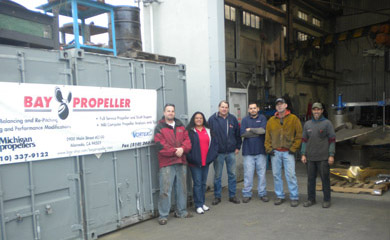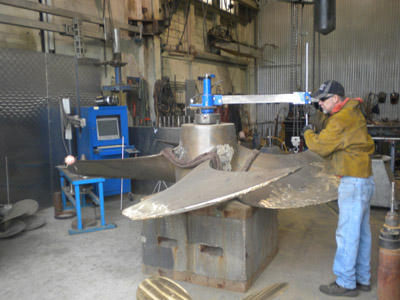Bay Propeller is the largest and the most complete propeller shop between southern California and the Columbia River.

The crew at Bay Propeller (from the left): Anthony Nelson, trainee; Tina Otenbriet, office manager; Jeff Tiernan, manager; John Castro, prop technician; Todd Simpson, shop leadman; and Bob Silva, machinist. Together they have a total of almost 100 years of professional experience in repairing and maintaining ship propellers.
By Wes Starratt, PE
Published: January, 2011
Bay Propeller is the largest and the most complete propeller shop between southern California and the Columbia River. It is managed by Jeff Tiernan, a metalworking professional with over 25 years of experience in repairing and maintaining propellers on every type of vessel. Located on San Francisco Bay on the estuary between Alameda and Oakland, Bay Propeller is one of a series of highly specialized shops operated by Bay Ship & Yacht in its effort to provide complete dry-docking services for both ocean and harbor craft.
Tiernan emphasized that he gets “great satisfaction in looking at almost all of the boats on San Francisco Bay, both commercial and pleasure, and knowing that we have maintained and repaired their propellers. That’s what keeps them going, and that’s what keeps us going.”
Tiernan got his start in the propeller repair business more than 25 years ago at another Bay Area shop where he received hands-on training from highly skilled technicians. With the demise of that business, Jeff started Bay Propeller in association with Bay Ship & Yacht in 1996. Shop Leadman Todd Simpson has been in the propeller business even longer than Jeff, as has Bob Silva, the shop’s chief machinist. “All of our training is hands-on and in-house, since there are no schools for propeller repair, which is really a unique combination of computer analysis and blacksmithing,” Tiernan said. “Not only do repaired propellers have to perform perfectly, but they have to look like new.”
“In addition to pleasure boats, we also work on all sizes of commercial vessel propellers, from tug boats and fishing boats to research vessels, and ferries,” Tiernan said. “We are capable of working with any metal, from aluminum to stainless steel and bronze alloys. Repairs include welding, straightening, polishing, balancing, non-destructive testing and inspection. We also do design analysis and modifications, such as re-pitching and tip modifications for noise reduction.” Tiernan added, “We can take heavily damaged propellers, renew blades, straighten them, and weld them so that are often better than new.”
Not only does the shop maintain and repair the propellers of ships dry-docked at Bay Ship & Yacht, but it also repairs propellers on large, ocean-going vessels dry-docked in San Francisco, such as the propellers on the U.S. Navy’s hospital ship Mercy, which was repaired recently. For out-of-yard work, Bay Propeller also has a mobile repair team that travels to locations where a vessel can be hauled out and its propellers repaired in-place.
Describing the shop, Tiernan explained that “the centerpiece of our shop is the Hale Measurement Recording Instrument or MRI, which is an advanced computerized system that can measure complex propeller geometry and provide a full report on a propeller’s condition. With that information, repairs can be made to meet very high tolerances.” The shop also has:
• A 200-ton press that is specifically designed to straighten large bends in propeller blades and rudders;
• Pitchometers that are capable of measuring propellers up to 26 ft in diameter;
• A custom-designed rotating balance machine for accurately balancing large propellers; and
• A full machine shop.
Tiernan takes great pride in Bay Propeller, not only because of its highly qualified and experienced team, but also because it has the complete range of equipment needed for all types of propeller work, plus the backup support of Bay Ship & Yachts’ other specialized shops and its complete dry-docking capabilities. He said, “There is only one Bay Propeller between San Pedro Bay and the Columbia River.”

Inside the Shop: Todd Simpson uses the Pitchometer for measuring the geometry of propellers.

